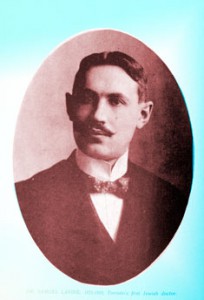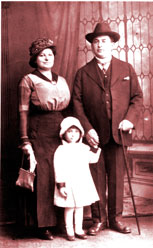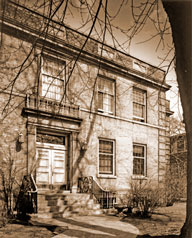Memoirs of Dorothy Goldstick Dworkin
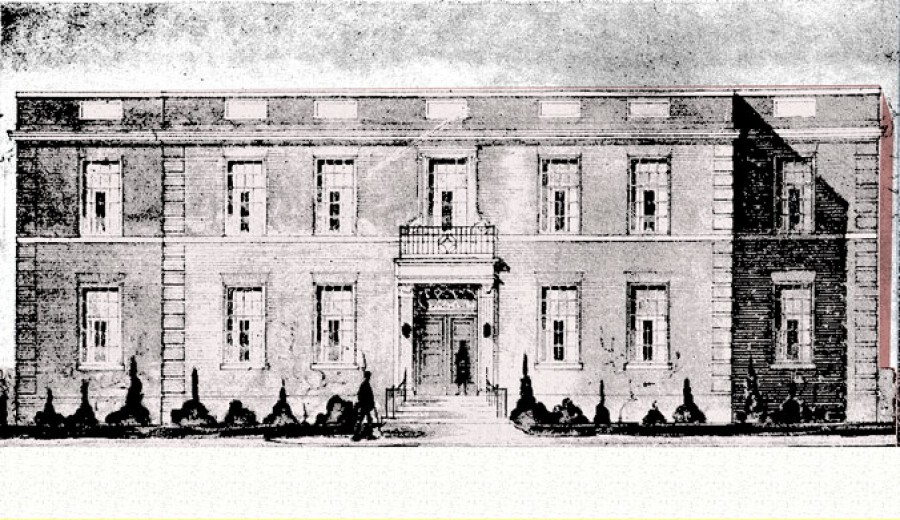 In the following article, the former Dorothy Goldstick relates her experiences working as a nurse and midwife in Toronto’s fledging Jewish community from 1907 to 1911, when thousands of Jewish immigrants from Eastern Europe and the Russian Pale were arriving in the city each year. Below, Dworkin profiled in 1968; and her obituary, 1976. Illustration above shows the old Mount Sinai Hospital, Yorkville Avenue, Toronto.
In the following article, the former Dorothy Goldstick relates her experiences working as a nurse and midwife in Toronto’s fledging Jewish community from 1907 to 1911, when thousands of Jewish immigrants from Eastern Europe and the Russian Pale were arriving in the city each year. Below, Dworkin profiled in 1968; and her obituary, 1976. Illustration above shows the old Mount Sinai Hospital, Yorkville Avenue, Toronto.
From The Jewish Standard, August 15, 1960
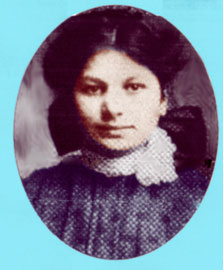 This is the story of my life from 1907 until 1911, as it was involved with the small Jewish community of Toronto at that time.
This is the story of my life from 1907 until 1911, as it was involved with the small Jewish community of Toronto at that time.
In 1907, faced with the problem of deciding on a career, I chose one which was considered outstanding for young ladies — I decided to become a Maternity Nurse. I was most fortunate, because a peculiar set of circumstances influenced my decision. Dr. S. J. Kaufman, a young Jewish doctor from Cleveland, married to a Canadian girl, came to Toronto to set up practice.
Not having tried the Ontario Medical Board Examination, he was not permitted to do so. He therefore hit upon the idea of opening a private dispensary for Jewish patients where, in collaboration with a few local physicians, he would be in charge. This dispensary was a great boon to the hordes of Jewish immigrants arriving from all parts of Europe. They could not speak English and could not make themselves understood at the outpatient clinics of the local hospitals; they could not afford the $1 fee of the private physicians and Dr. Kaufman charged only fifty cents in his clinic.
Dr. Kaufman’s colleagues were Dr. Sylvester, a leading surgeon, Dr. Patton and Dr. Lyon, an eye and ear specialist. These gentlemen were pleased to employ me and to train me to work with them. The experience I gained at this time was invaluable.
After I had spent about a year working under Dr. Kaufman, he suggested that I go to Cleveland for additional training at Mount Sinai Hospital and try the state Board Examinations in Midwifery at Columbus, Ohio. He referred me to Dr. J. F. Davidson, a professor at the Cleveland University on the staff of the Mount Sinai. Dr. Davidson sponsored me, encouraged me, taught me and prepared me for the examinations. In 1909, I received my Diploma from the Medical State Board of Ohio.
Before I left Toronto Dr. Kaufman had decided to return to Cleveland, and a group of people, headed by Ida Siegel and her brother, Abe Lewis, formed a special committee to take over Dr. Kaufman’s work and found a free Jewish Dispensary. I will try to recall as many of these people as possible: Mr. Shulman (father of our Percy Shulman), two Messrs. Benjamin (brothers), Dr. Singer, Dr. Lavine, Dr. Pullan (the first Jewish woman doctor in Toronto, who never set up practice, but married a Mr. Singer), Mr. Goldstein, Mr. Wilson, Mr. Graner, Mr. M. Langbord, and many others.
It had been decided that I would be in charge of the Dispensary upon my return to Toronto; until that time, the late Mr. Hashmall dispensed drugs and carried on as best he could. Our quarters were on Elizabeth Street near Agnes (now Dundas Street). The Dispensary was open for about three hours daily; the rest of my time was devoted to home calls, which were often made at night, since babies are almost inevitably born in the small hours. Moreover, doctors could often not even be reached in time or could not get to their patients quickly enough on their bicycles. Very frequently I found myself forced to deliver the babies either alone, or with the assistance of a neighbour or relative.
In those days women were terrified of hospitals, especially if they could not speak English. I remember a particular case where a deserted mother lived in abject poverty. Her home lacked even the barest necessities; obtaining hot water was a major undertaking. The doctor in charge insisted that the woman go to hospital. He anticipated trouble and washed his hands of the case unless he could use hospital facilities. But the poor woman was terrified and remained at home, in labour, for two days. Finally, with the help of two devoted members of the Maternity Aid Society — Mrs. Pasternak and Mrs. Bockneck — I persuaded her to go to hospital. The ambulance was called, the patient was on the stretcher — but at the last minute she panicked. She would not leave her home. Her baby came quickly and with the assistance of these dedicated ladies I delivered the child.
My first ride in a motor car was in Dr. Lavine’s automobile. We were on our way to a delivery; he cranked frantically to get it started. I told Dr. Lavine how thrilled I was to drive in a car, but he suggested that I should not count my chickens before they hatched. One never knew whether the car would keep going or for how long.
It is very interesting to note that many of the ladies whom I attended were very sorry for me. Rumour had it that nurses were not permitted to marry. I fooled them.
The following doctors were active in the Free Jewish Dispensary: Dr. S. Lavine (one of the first Jewish doctors in Toronto), Dr. Singer (brother of our late Fred Singer), Dr. A. I. Willinsky. Later: Dr. L. J. Solway, Dr. Frawley, Dr. Boddington, Dr. Gaby and Dr. Stutt. There were often as many as sixty to eighty patients.
In 1910 I helped form a Women’s Auxiliary. Among other undertakings, we provided the distribution of pasteurized milk. This service had originally been begun by a group of missionaries, and a Jewish group found it expedient to take over. Ida Siegel was very active in this work. We used to keep the bottles of milk cool in cans packed with ice and distribute them for two cents a pint.
Incidentally, the Women’s Auxiliary enlarged and organized an orphanage and carried on for some time as a very active group. It included two Cooper sisters, Mrs. Fremes and again, Ida Siegel, as well as many others.
In 1911 I married Henry Dworkin. I left my work at the Dispensary and, shortly afterward, it petered out. Because of my connection with the Dispensary, the close contact I had with the patients, the realization that Jewish people need a place of their own in which to be sick, I have always felt the necessity for our Mount Sinai Hospital. It has been my privilege to dedicate a good part of my life to working towards this goal. ♦
* * *
Woman in the News: Dorothy Dworkin (1968)
At age 78, Dorothy Dworkin still rose each morning at 6:30 or 7 a.m., went to the office and worked a complete day until five or six o’clock, the Canadian Jewish News reported in its issue of September 6, 1968.
Known to thousands of Toronto Jews as owner of D. Dworking & Company, travel agents, and agents for the New York Yiddish dailies, Mrs. Dworkin was born in Windau, Latvia to parents Wolf and Sara Goldstick, one of four boys and seven girls. The family immigrated to Toronto in 1905.
After acquiring a basic education in Toronto, Mrs. Dworkin studied nursing and midwifery in Cleveland, Ohio, then returned to Toronto where she delivered more than 150 babies, many of whom became her friends and customers. She was involved in planning Toronto’s first Jewish hospital where prospective Jewish doctors could work and study (which they couldn’t do in other city hospitals).
“I now can look back witgh pride and joy at what we were able to accomplish for those boys, many of whom became great doctors as a result of the founding of Mount Sinai Hospital,” Mrs. Dworkin told the newspaper.
The former Dorothy Goldstick married Harry Dworkin in 1919 and with her husband, a dealer in motor accessories, founded the present business. They resided in the Manning-Harbord neighbourhood and had one daughter, Honey, who married Leon Arthurs, an attorney. Harry Arthurs, their son, became a noted professor of law at Osgoode Hall; Cindy, their daughter, married Joel Ulster, a wholesale drug manufacturer. Harry Dworking was tragically and fatally struck down by an automobile in 1928; thousands of people lined the street as his funeral procession passed by.
In 1968, Mrs. Dworkin still had three living sisters: Betty Lingreen and Hantza Komstan of Toronto, and Jean Sloane of Ottawa. All of her brothers had already passed, including the well-known Professor Isadore Goldstick who taught high school in London, Ontario, and late in life was accepted as a lecturer at the University of Western Ontario.
Mrs. Dworkin’s philosophy is: “If you are healthy, don’t spare yourself. Keep active, enjoy people. You can’t always do what you want so accept what life gives and make the most of it.” Always good advice. ♦
* * *
Dorothy Dworkin dead at 86
From the Canadian Jewish News, August 13, 1976 (paraphrased)
The Canadian Jewish News of August 13, 1976 reported the death of Dorothy Dworkin at age 86, describing her as “one of this community’s earliest travel agents and a prominent backer of the Yorkville Mount Sinai Hospital.”
She came to Toronto in 1904 with 11 brother and sisters, the paper reported. She was the first president of Mount Sinai’s women’s auxiliary, and remained on the board until the hospital’s move to University Avenue. She and her husband, Henry (Chanan), who died in 1928, were travel agents at a time when agents often helped arrange to passage for immigrants, secured employment for them, put them in touch with relatives, and offered them loans — “a combination travel agent, vocational service and social worker.”
The Dworkins sold the Forvert and other New York Yiddish dailies, and occasionally hosted visiting writers from these papers in their home. After her husband’s death, from about 1935 to 1955, she published a Canadian supplement to these American papers, inserting it for free into larger newspapers.
In the days before government medical coverage was available, she was one of the prime volunteers operating the Free Jewish Dispensary on Elizabeth Street, and was one of the first Jewish nurses and midwives practicing in Ontario. She served as the secretary of the Jewish Labor Committee in the mid-1930s and was active in the Canadian Jewish Congress, ORT and Pioneer Women.
She leaves behind her daughter Honey Arthurs; grandchildren Harry Arthurs, dean of Osgoode Law School, and Cindy Ulster, as well as five great-grandchildren. ♦

